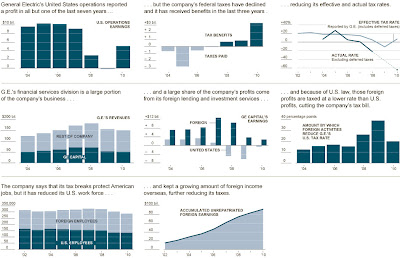by Trader Mark, Fund My Mutual Fund
Lost in the current political fuss about lowering the corporate tax from "35%" is the fact that corporate profits as a % of GDP are at record lows in the U.S. With armies of accountants (many former government officials) and tax havens across the globe our largest corporate citizens play games of "Double Irish" and "Dutch Sandwich" (what are these? see here), in between lobbying for loopholes galore in the U.S. tax system. Yes we do have socialism in America ... but it's mega corporate socialism. Whose are the suckers actually paying 35%? Small business. This is why there is actually resistance on Capital Hill to changing the corporate farce that is the "35%" rate to something lower - because it's nothing more than a talking point for our multinationals to whine about.
The New York Times has a fantastic expose on the nation's largest welfare recipient corporation - General Electric (GE). I will give the CEO Jeffrey Immelt credit though - at least he admits what GE does - here is a quote I've posted a few times the past few years on the site when discussing the "free market" in the U.S.:
It's never been a free market; it's never gonna be a free market. That's just the way it is. The fact that I'd like GE to work in concert with where government policy is in the U.S. doesn't mean that I'm a traitor or a bad guy, I think it's just being practical that that's gotta happen.
That quote speaks more to 'winning' business, but the NYT piece today focuses far more on the financials of the company. For example:
- General Electric, the nation’s largest corporation, had a very good year in 2010. The company reported worldwide profits of $14.2 billion, and said $5.1 billion of the total came from its operations in the United States.
- Its American tax bill? None. In fact, G.E. claimed a tax benefit of $3.2 billion.
It all has become a bit of a farce - we've posted many stories on this subject ....who can forget the public housing companies who banked record profits due to the Greenspan/Berananke bubble - but lobbied to get all those taxes credited back during the downturn? When they did not get what they wanted, they rescinded lobbyist dollars .....and within weeks they got the legislation they demanded. [Jun 23, 2009: WSJ - Land Rules, Tax Changes and Government Largess Keep Homebuilders Alive] [Apr 4, 2008: Congress is Rushing to Help Homeowners Out!! (Not)] Who says Congress can't move fast? I believe it is called bribery in other countries, but we just call it "the political process". I could go through a litany of examples in almost every industry, but I prefer to keep my breakfast down...
As speculators in the market - this is a 'good thing'. After all paying a tiny fraction in taxes increases profits. So we can slap a PE ratio on that lightly taxed profit base and apply an appropriate price, which obviously would be much higher than if these corporations paid what was due under the spirit of the tax code. Obviously, in terms of a $1.6T annual federal deficit ... it's not quite so bright of an outcome.
----------------------------------
Anyhow, some snippets from the NYT piece:
- In a regulatory filing just a week before the Japanese disaster put a spotlight on the company’s nuclear reactor business, G.E. reported that its tax burden was 7.4 percent of its American profits. (stop taxing us at 35%.... it's onerous! Yes your local owner of the plumbing business is paying 35% but not the mega honchos filling the pockets of the political class)
- Even those figures are overstated, because they include taxes that will be paid only if the company brings its overseas profits back to the United States. With those profits still offshore, G.E. is effectively getting money back.
- Its (GE's) extraordinary success is based on an aggressive strategy that mixes fierce lobbying for tax breaks and innovative accounting that enables it to concentrate its profits offshore. G.E.’s giant tax department, led by a bow-tied former Treasury official named John Samuels, is often referred to as the world’s best tax law firm. Indeed, the company’s slogan “Imagination at Work” fits this department well. The team includes former officials not just from the Treasury, but also from the I.R.S. and virtually all the tax-writing committees in Congress.
- Such strategies, as well as changes in tax laws that encouraged some businesses and professionals to file as individuals, have pushed down the corporate share of the nation’s tax receipts — from 30 percent of all federal revenue in the mid-1950s to 6.6 percent in 2009. Yet many companies say the current level is so high it hobbles them in competing with foreign rivals.
- “In a rational system, a corporation’s tax department would be there to make sure a company complied with the law,” said Len Burman, a former Treasury official who now is a scholar at the nonpartisan Tax Policy Center. “But in our system, there are corporations that view their tax departments as a profit center, and the effects on public policy can be negative.”
- Transforming the most creative strategies of the tax team into law is another extensive operation. G.E. spends heavily on lobbying: more than $200 million over the last decade, according to the Center for Responsive Politics. Records filed with election officials show a significant portion of that money was devoted to tax legislation. (lobbying has the best Return on Investment of any major operation our largest corporations do - billions in profits saved for a mere couple hundred million in this case)
- While the financial crisis led G.E. to post a loss in the United States in 2009, regulatory filings show that in the last five years, G.E. has accumulated $26 billion in American profits, and received a net tax benefit from the I.R.S. of $4.1 billion.
G.E. obviously has tiger blood.... adonis DNA.
Of course as a side note you know Immelt is now the head of the committee to figure out how to create jobs in the U.S. - even as GE has axed tens of thousands in the U.S. Sounds logical.....corporate socialism rocks.
- President Obama has designated G.E.’s chief executive, Jeffrey R. Immelt, as his liaison to the business community and as the chairman of the President’s Council on Jobs and Competitiveness, and it is expected to discuss corporate taxes.
- Since 2002, the company has eliminated a fifth of its work force in the United States while increasing overseas employment.
No position
Copyright © Trader Mark












